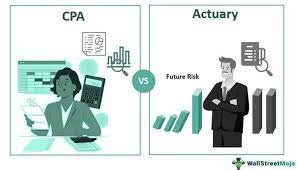Quantifying Risk
You don't have to be an actuary, but it helps
They say that “actuaries are people who don’t have the personalities to be accountants”. This is unfair to both actuaries and accountants, of course, but both professions have an image problem and as a result many bright and quantitatively inclined students migrate to finance as an alternate career path. But lurking in the background of the world of finance are all those under-appreciated accountants and actuaries. We financiers couldn’t do our jobs without them and it behooves us at a minimum to learn a bit more about what they do and how they do it. If nothing else, it might make us all a bit more humble about our self-reverential place in the world of finance.
Studying to be a certified accountant or actuary is not easy, and the path to become an Associate or Fellow in the Society of Actuaries (SOA) is particularly tortuous, as described in this WSJ article. But actuarial science is at the heart of the insurance industry and the skill sets developed by actuaries are widely applicable in risk management roles across the financial services industry and in business more generally. So why don’t more students study to become actuaries, which is now a well paying profession in its own right? Because it is hard and not very sexy. Nevertheless, those of you who are mathematically inclined might consider this option, at least taking some courses if not changing your major. Click here learn more about the Actuarial Science program at W&M.
Not everyone who works in the insurance industry is an actuary, or course, and I have often recommended to my finance students that they consider insurance as a career. Insurance is a large, complex and fast changing business which is desperately in need of a new generation of executives in a wide variety of roles. And there is a lot of money to be made (and lost) in insurance. When you consider insurance as a possible career, think of role models like Warren Buffett or Todd Boehly, not Ned Ryerson.
I have said that actuaries sit at the heart of the insurance industry. But what is it that actuaries do and why is this so important? Simply put, actuaries analyze data and quantify risk, the information from which is then used to structure, price and market all sorts of insurance products (life and annuity, property and casualty, health….) The premiums paid on insurance policies are collected by the insurance company in advance of paying claims, some of which take years or even decades to mature, during which time the insurance company invests this “float” to generate investment income for its own account. The total income generated by an insurance company thus consists of two components: underwriting income and investment income. But without the input of teams of talented actuaries, there would be no float for the insurance company to invest (or not for long anyway).
For an insurance company to become the next Berkshire Hathaway, it needs to do both of these things well: underwrite insurance policies at a profit and invest the float to generate superior financial returns. And it must do so consistently and over a long period of time. If this were easy, everyone would do it, but it isn’t and they don’t. There aren’t many Warren Buffetts out there, although there are more than you might think including some just up the road in Richmond. (I am thinking here of the folks at Markel, not Genworth.). But there would be no Warren Buffetts or Berkshire Hathaways without an army of smart actuaries helping them to analyze risk.
Finance students often ask me some version of this question: “ What are the other (non-finance) courses that I should take while I am still in college. And my answer is generally the same: “Take more accounting, probability/statistics, and data analytics”. You can’t be a good corporate finance professional if you can’t understand (and model) a complex corporate financial statement, and you can’t succeed in any financial risk management or investment function if you can’t interpret and analyze a wide variety of often fast-changing data. To be a well-rounded financier today requires that one learn more about these subjects—accounting, probability/statistics and data analytics— than is generally taught in most undergraduate finance curriculums. And for many students, this may require taking more courses outside your finance major or doing some remedial work on your own.
Most finance students and professionals think of themselves as naturally analytical and quantitative, but how much do we really understand about even the basic types of data analysis done by actuaries and other risk professionals? I’m not sure, but I suspect less than we might have thought (or wished). In any event, I encourage each of you to take a few minutes and attempt to answer just a few of the questions posted on the SOA 2018 study guide. You can find the questions here and the answers here.
I did this and I was suitably humbled. But I have been out of school for over 40 years now, my graduate degree and first career was in law, and I am no longer practicing finance professionally. What is your excuse?
Links:
Want to be an Actuary? Odds are you will fail the exam. WSJ 12.28.2021

